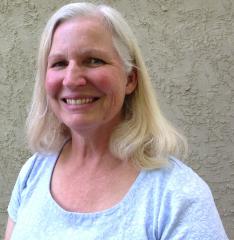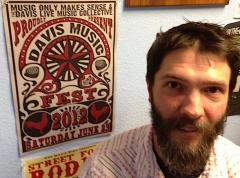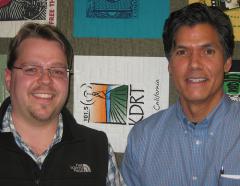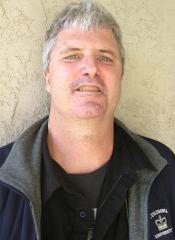Davis has interesting people, ideas, connections, and events. On Davisville, host Bill Buchanan presents stories that have some connection to Davis. The program has won 17 Excellence in Journalism awards from the San Francisco Press Club since 2018, including first place in radio/podcast public affairs programs for 2025, plus a national Hometown Media Award for excellence from the Alliance for Community Media in 2024. Contact: davisville @ dcn.org
 Podcast
Podcast
Davisville, 5/13/13: Ragdolls are sweethearts, Manx are quietMon, 05/13/2013 - 6:05pm | Bill Buchanan
|
Davisville, 4/29/13: Pinball returns, if only for a weekendMon, 04/29/2013 - 6:05pm | Bill Buchanan
|
Davisville, 4/15/13: An update on homelessness and Grace in ActionMon, 04/15/2013 - 6:05pm | Bill Buchanan
|
Davisville, 4/1/13: 'Before I graduate, I want to ...'Mon, 04/01/2013 - 6:05pm | Bill BuchananHow would you finish that sentence? UC Davis student Henry Lam wants to know—specifically, he invites you to write your answer on a chalkboard wall outside the Memorial Union April 3 or 4. It’s all part of a larger strategy. We discuss the project on today’s Davisville, as well as a half-dozen other campus projects he is part of, including the UC Davis Film Festival, the UC Davis Vietnamese Student organization, and last year’s Davis in a Day movie. Find updates on the event at http://ucdbeforeigrad.tumblr.com |
Davisville, 3/18/13: Asteroids, climate change, and Davis with Tom CahillSat, 03/23/2013 - 8:05am | Bill Buchanan |
Davisville, 3/4/13: Live music in DavisWed, 03/06/2013 - 9:05am | Bill Buchanan |
Davisville, 2/18/13: The 'other Davis' with the Vanguard's David GreenwaldMon, 02/18/2013 - 7:30pm | Bill Buchanan
|
Lee and Frerichs, part 2: Davisville, 2/4/13Tue, 02/05/2013 - 7:05pm | Bill BuchananThis is the second halfof an interview with Davis' newest City Council members, Lucas Frerichs and Brett Lee, who took office last summer. Find part 1 at http://www.kdrt.org/node/11291. |
Davisville, Jan. 21: Impressions from their first six monthsMon, 01/21/2013 - 6:05pm | Bill Buchanan
|
This journalist helped convict a Davis killerMon, 01/07/2013 - 6:05pm | Bill Buchanan
|


 Pinball’s pop-culture glory era has yielded to computer games and the likes of Angry Birds, but the silver ball still has fans. One of the biggest has to be Steve Faith of Davis, an educational technology instructor who is helping to organize the 2013 Pin-a-Go-Go show May 17-19 at the May Fairgrounds in Dixon. It will have more than 100 machines ready for play. On today’s Davisville we talk about the appeal of the noisy, ringing, electromechanical games. Few remain in Davis, but Faith tells us where to find them.
Pinball’s pop-culture glory era has yielded to computer games and the likes of Angry Birds, but the silver ball still has fans. One of the biggest has to be Steve Faith of Davis, an educational technology instructor who is helping to organize the 2013 Pin-a-Go-Go show May 17-19 at the May Fairgrounds in Dixon. It will have more than 100 machines ready for play. On today’s Davisville we talk about the appeal of the noisy, ringing, electromechanical games. Few remain in Davis, but Faith tells us where to find them.




Comments
You're a Davis icon, Bill. Keep up the good work of providing local, informative, and quality programming.
Bill, listen to the first 10 minutes of my show dated 7/7/2010. I hope you approve.
Paul Sheeran
Just wanted to say thanks for an outstanding interview with Freedom From Hunger's president, Chris Dunford.
Keep up the good work!
Sam Citron
thanks, Sam!
This is the program in question; it aired Jan. 25:
http://www.kdrt.org/node/2689
Bill
Post new comment